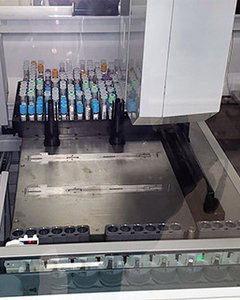The Sarah Bush Lincoln Laboratory is one of the most technologically advanced areas of the Health Center and it just became more advanced, delivering high quality lab results faster while reducing the potential for human error.
The Lab installed a Beckman Coulter DxA 5000 total lab automation system that streamlines and automates much of the testing systems for chemistry, hematology and immunoassay, a test used to detect the presence or quantity of a substance in the blood. Sarah Bush Lincoln is the first hospital in the United States, and the third lab in North America to have such a system.
Lab Manager Dave Sowers explained that there were primarily three reasons for investing in the Beckman Coulter system. “It increases our ability to process more lab specimens, reduces processing errors, and produces consistent and improved turn-around times on lab results,” he said.
Sowers added the SBL lab has a long history related to its accuracy, but nationally about 60 percent of errors in any lab occur in the pre-analytical stage. Generally, it involves preparing the sample for testing. This system compensates for a portion of that human error and stops the test.
He explained that various tests require different collection tube types, which is indicated by the test tube cap. In the first three seconds, the automation line robotic system takes a picture of the tube, reads the bar code to discern if the test ordered matches the collection tube, weighs it to determine if the test tube is too full or not full enough, and identifies if the specimen requires centrifugation for the testing to be completed. If it is not appropriate, the system will move the tube to an error rack for a staff member to resolve. Prior to the Beckman Coulter system, this portion of the process was performed manually.
The expansive system resembles a small conveyor belt that runs around all the lab analyzers, moving test tubes into the appropriate analyzers, resulting the test to the patient’s electronic medical record and then placing it into a refrigerated storage area. If, at a later time, the ordering physician places an order for a different test, the system automatically will pull the test tube from storage and route it to the appropriate analyzer.
One of the underlying reasons Sarah Bush Lincoln made the investment in the system is because of the aging workforce in the SBL lab. Sowers explained that in about five years, a large portion of the Lab staff will retire with fewer candidates to fill their seats. Lab scientists typically have three years of college and a one-year internship at a Nationally Accredited Agency for Clinical Laboratory Science (NAACLS) facility, an accreditation that few schools and laboratories still maintain. He said, “Many students don’t realize the potential careers as scientists so fewer students are pursuing the field. It’s reported that about 12,000 lab staff retire each year with only 5,000 scientists entering lab work.”
As the handling of test tubes by scientists is decreased due to automation, it frees up about 30 percent of their time, thus allowing the scientists more time to focus on quality. “As the machine processes the specimens efficiently, it permits scientists to devote the necessary time to handle difficult tests that result outside of the normal boundaries. They can do all they were trained to do in school to ensure quality results are being turned out,” Sowers said.
“We’re just really thrilled with the new system and how smoothly it works,” he said. For more information, contact Dave Sowers, 217 258-2245.

